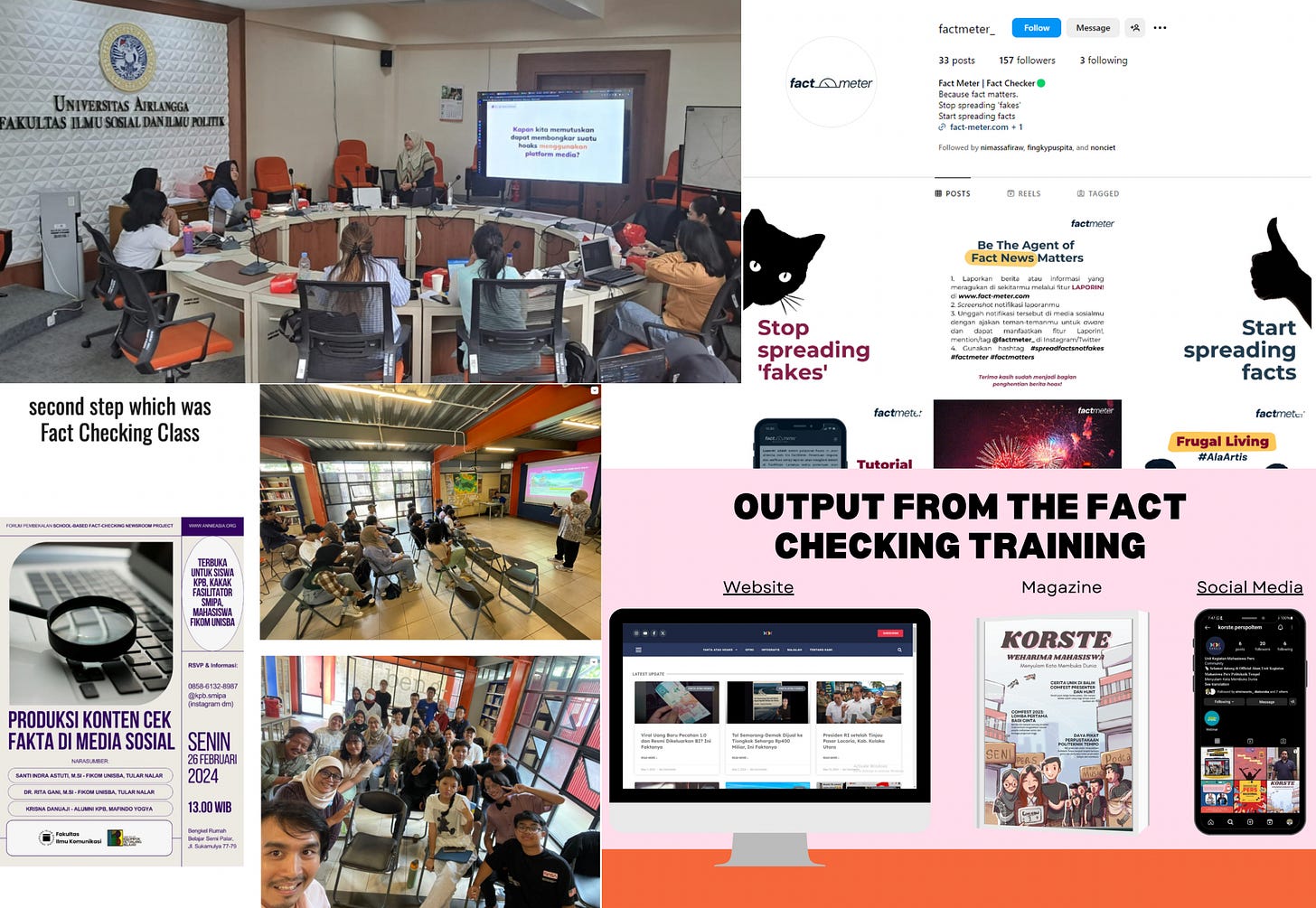Growing pains of campus fact-checking
Instructors and students form six schools shared their experiences in ANNIE Connect
In the last two online meetings, we were lucky to have six members from ANNIE School Net share their stories about their fact-checking projects on campus.
Overall, our collective international efforts are moving forward steadily, but this kind of educational endeavour is never smooth sailing. Our two gatherings aimed to learn from each other’s experiences.
One of the challenges mentioned a few times was engaging and motivating many students, not just the enthusiastic ones, to participate actively in the project.
Here are some good practices ANNIE identified in the meetings:
Demonstrate how fun and satisfying fact-checking can be by showing its process and actual impact;
Show students how learning fact-checking tools and techniques helps them develop better critical thinking and communication abilities with examples;
Offer this experiential learning opportunity as part of elective (or compulsory) credit-bearing courses;
Collaborate with media professionals and news outlets for training, mentorship, and resource sharing (this approach also significantly enhances the quality and impact of student-driven fact-checking projects);
Leverage various formats and platforms, such as radio, Instagram, TikTok, YouTube, etc., that students frequently use;
Encourage them to share/amplify their findings among their peers, family, and beyond and see their reactions;
Have students translate the fact-checking stories into their regional languages and dialects (as many Asian students are multilingual).
Quick summaries of six presentations
Universitas Multimedia Nusantara (UMN) | Indonesia
Lecturer Samiaji Bintang Nusantara lecturer leads a student-driven fact-checking project as part of an elective course involving around 25 students. In the course, students learn media and digital literacy, as well as fact-checking principles and tools. As part of the project, students produced short videos, fact-checked presidential candidates, and explored Generative AI tools.
Universitas Airlangga | Indonesia
Dr. Irfan Wahyudi has integrated fact-checking into their curriculum through a course called Digital Journalism and Big Data. Students undertook two projects, Fact Meter and Fakta Pemilu, creating websites and social media accounts to engage audiences. After the course, Irfan’s team, including interested students, decided to continue Fact Meter as a long-term project. They received training from TEMPO media professionals and plan to produce regular content.
De La Salle University-Dasmariñas | the Philippines
Associate professor Isolde Valera presented their fact-checking project involving Digital and Multimedia Journalism program students. The project, primarily conducted through campus radio Green FM 95.9, included a three-day fact-checking workshop led by Professor Rommel Lopez from PressOne PH. Through a live radio programme, some students shared their experiences and insights they gained. In the future, Green FM’s website will publish student-authored fact-checking articles after rigorous editing by the faculty.
O.P Jindal Global University | India
Professor Venu Arora and students Sheikha Mariyam Sam and Uddantika Kashyap presented their project, Fact Check Lab, which will take advantage of the university’s student-run, faculty-supervised television and radio studios. The students discussed the challenges of the disinformation landscape in India and the need for fact-checking content. The school has held two workshops so far and discussed topics such as information monitoring, content creation, and increasing reach and impact.
Politeknik Tempo | Indonesia
Lecturer Rachma Tri Widuri and student Ariadne Khatarina Moniaga discussed their project, which began with an online orientation by ANNIE and training by speakers from Uhamka and Mafindo, teaching students how to identify hoaxes and debunk them. The six-week course also discussed prebunking. All participants received a certificate in the end. They run a fact-checking website and social media channels for publishing articles and videos. They have produced a project magazine as well.
Rumah Belajar Semi Palar | Indonesia
Leo Amurist, a project coordinator, presented a student-created pilot video discussing whether yoghurt can cause depression. Students attended fact-checking training by speakers from Bandung Islamic University (UNISBA) and Mafindo. Their approach is to learn through practice. They plan to explore other formats besides video, such as infographics and podcasts, in the future.




